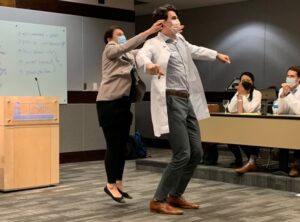Career Development and Resident Leadership
Career Development

At the University of North Carolina, we pride ourselves in our collegiality and shared mission. This makes the process of career advising and mentoring one that can be individualized to meet each resident’s personal and professional needs.
Mentorship requires a relationship. Our professional development curriculum includes instruction about being a mentee, identifying mentors, and working within the mentor-mentee relationship. During frequent meetings with leadership, including the Program Director, Associate Program Directors, Chief Residents, and even the Chair of our Department, we will work hard to identify your individual career needs and will work to help pair you with future mentors early in your training.
Every year, interns are guided to outline their career goals and aspirations during their meetings with program leadership and subsequently directed to specific faculty with shared interests. Interns and residents interested in research or specific careers can meet with the director for the Physician Scientist Program and the Associate Program Director for the Medicine Residency program to identify research projects and mentors that fit the interests and needs of the resident. Residents are also encouraged and welcomed to directly contact faculty, taking full advantage of the spirit of UNC’s collegiality.
Residents interested in applying for fellowship are encouraged to meet with the fellowship program directors and are also steered toward our identified faculty mentors in each subspecialty field to explore their individual goals and interests. Residents all receive assistance and feedback on their CVs and personal statements, and those entering fellowships can participate in “mock interviews” prior to fellowship interview season. We have a diverse array of inpatient and outpatient subspecialty electives available to residents looking to explore different specialties, where they can further cultivate mentorship opportunities.
For those interested in pursuing outpatient or hospital medicine, career exploration electives available include rotations in private practice clinics in the area as well as hospital medicine in which residents can work directly with faculty and learn more about quality improvement and hospital administration.
No matter the career interest, residents are encouraged to participate in a variety of resident leadership opportunities, which are not only educational but also provide further avenues for mentorship building. Our resident service line leaders work closely with faculty members to actively improve resident and patient experience on each of our teaching services.
Our personalized approach to career advising and mentoring has led to continued success as our residents pursue a diverse array of careers.
Resident Leadership and Service Line Leaders
Many residents within our internal medicine program are passionate about medical education and would like to contribute as much as possible toward optimizing all components of our inpatient and outpatient experience. Resident autonomy is central to the philosophy of our program and the trajectory of the program overtime has been continually driven by resident feedback and resident-led innovations.
Service Line Leaders were developed in 2019 and have been instrumental in enabling resident-driven change and improvement among our teaching services. It is an outstanding opportunity to be a leader for our program and to work directly with attendings and program leadership to push forward resident led initiatives.